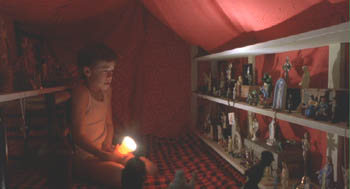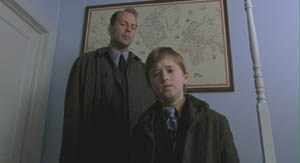|
This, for most people, is where it all started. It didn't literally start here for M. Night Shyamalan; he'd made two films before this one, but neither had landed with much of a splash. For many viewers, it ended here, too, though a good number held on for a few films longer. I for one, don't think that this film was the holy grail of thrillers that so many seemed to view it as. But it showed some real promise, which is why it's such a shame that said promise was revealed as a disappointingly false one. 
I have a problem with this film. It's not one related to its craftsmanship as a piece of art, so I'll leave discussion of it for later. To begin with, for those few people who haven't long since known, the story is about a young boy with a particularly bizarre affliction, and the psychologist who tries to help him. The boy, Cole Sear ("seer") sees ghosts; the doctor, Malcolm Crowe, is smarting from a past failure concerning a similarly disturbed boy whom he couldn't help. The boy is regarded as a freak by most of his peers; the doctor is feeling his marriage slowly dissemble in front of his eyes. There's a much-discussed plot twist you probably know, as indeed I knew long before I ever saw the film. I was still able to enjoy it in spite of this foreknowledge, which speaks to the film's general effectiveness, but it likely diminished the experience. Some twists work better than others, and don't sully subsequent viewings (The Empire Strikes Back comes to mind, a film which was unfairly bumped from the top ten best grossing list by this one, which holds up far less well as time meanders along). With horror as a genre having long since devolved into serialized iterations of unkillable serial killers slaughtering their way through casts of cardboard characters, a film like this constitutes a real breath of fresh air, a harkening back to the days when an ostensibly scary movie could also be a respectable one. Characters actually matter, though there are really only two of consequence. The doctor and his patient both need something from the other; the film is ultimately a quiet, pleasingly non-strident plea for cooperation. The cinematography is attractive and concise; one does not see a collection of shots that were anything but carefully chosen. Framing in earlier sequences emphasises Cole's sense of isolation, in some ways recalling Danny Lloyd from The Shining, another highly-regarded spook story about a boy with a frightening ability to see things others couldn't. Also like The Shining, it moves slowly, perhaps too much so. Very little actually goes on in the film in the way of major plot events. This is the film's primary weakness, if still not my real beef with it. 
Everyone by now probably knows the film's big, dramatic left turn. It's the first thing anyone is likely to think of when this film comes to mind. This is mostly because the film remains cooly detached for most of its running time, offering no other major upheavals. The film's second, and likely unintentional, twist is that it's a scary movie that isn't scary. The chilly mood is only sufficient to provoke foreboding in its audience when they don't yet know that nothing scary is actually going to ever happen. Once that is known, it dulls any sense of tension in repeat watchings. And while it wisely avoids the major tropes of then-recent horror pics, it's not above mining those of an earlier era: Malcolm's discovery of ghostly voices on his tape recorder recalls similar events in 1980's The Changeling, and the first manifestation of supernatural tomfoolery in the film is shamelessly purloined from Poltergeist, right down to the camera move (the single-shot "mother leaves the newly-tidied kitchen for a moment and returns to find it in disarry" scene). If not for the final scene, the entire movie would feel unsatisfyingly hollow, a journey composed of fine performances and smart cinematography in the service of a story whose through-line barely fluctuates along the way. It's certainly worth seeing once, especially if you know nothing about it. But after two times, you've seen about everything it has to offer. That being said, I must now explain my specific, personal issue with this film, which will include mention of that shock ending all but maybe .0002 of you already know. I might never have felt it had I not seen the remainder of Shyamalan's work, which brought to light some very specific patterns. Most of his stories focus on bizarre, super-or-unnatural events, most feature marriages in crisis and precocious children. In most, closure is acheived when the protagonist is able to accept the irrational, be it the idea that he is a superhero (Unbreakable), that plant life is trying to kill us (The Happening), or the completely idiotic "God cut my wife in half with a car so her dying words would later inspire my brother to hit an alien with a baseball bat" (Signs). There's a book about the director entitled "The Man Who Heard Voices, or How M. Night Shyamalan Risked his Career on a Fairly Tale" (later editions appended the words "and lost" to that already-overlong title). The fairy tale in question was Lady in the Water, possibly his worst film ever, about a bunch of sad sacks who are told said fairy tale and accept it without question, the way sane people would not. In the book, Shyamalan claims to truly hear voices. These voices supposedly helped him to write his critically-lauded script for The Sixth Sense. He really believes this nonsense. And with that knowledge in hand, it suddenly becomes frighteningly clear what's happening here. The Sixth Sense, and in many ways most of his films, are nothing less than autobiographical in nature. Shyamalan is the boy who heard voices from the beyond. He learned to listen to them. His doctor character believes, logically, that the child has some mental disorder. The doctor is wrong. For smugly relying on facts and evidence, he is not only murdered, but his soul cannot be at rest until he makes amends by convincing another kid to listen to the voices. What this man is saying to the millions who loved this incredibly successful movie is that, simply, if your kid tells you he hears things or sees ghosts or has a monster under his bed, don't try to be rational with him. Don't seek medical help or counseling. Just accept it at face value. If your child sees dead people, she's not schizophrenic or anything; she's just honest and needs you to buy into it, too. This is appallingly shitty advice, little different than the faith healers who urge people to discard their medications in favor of prayer or talismans or putting magnets on their heads. Posterity often has a word for followers of such advice: corpses. I know that a piece of art is supposed to be viewed on its own, separate from the artist or artist's intent, but when the intent is so shockingly dangerous and irrational, such a detachment becomes almost insurmountable. -review by Matt Murray
|
|
||||||||